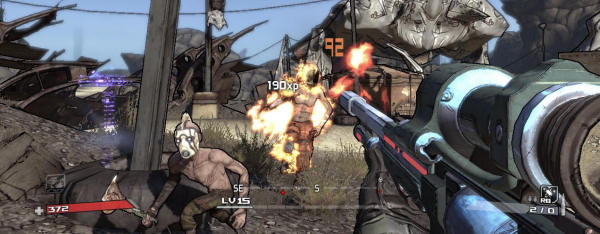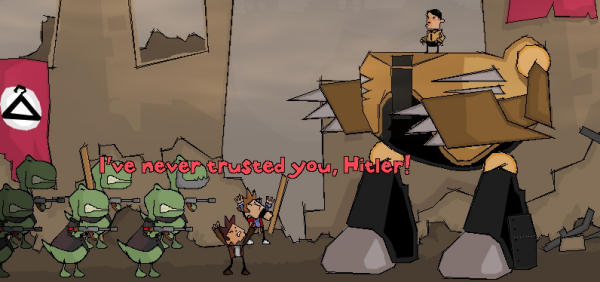The Steamy Issue Of Digital Distribution
As mentioned in the Sunday Papers yesterday, there has been some controversy sparked after remarks made by Gearbox's Randy Pitchford to Maximum PC regarding Steam, where he stated that the digital distribution service from Valve was "exploiting a lot of small guys." This was later countered by an article on Gamasutra where Tripwire's John Gibson retorted, "Ask the Tripwire Interactive employees if they feel exploited, as they move into their new offices paid for by the money the company has made on Steam."
Interested to see if there were other positions we spoke to 2D BOY and Zombie Cow, who have sold their games on Steam, to find out about their experiences.
Says 2D BOY's Ron Carmel:
"Valve's digital distribution agreement is the simplest and most developer friendly agreement I've seen so far, and we've signed over a dozen of those. Also, no other digital distribution service I know of, PC or console, pays a higher cut of the revenues out to developers."
But before we get to that, let's elaborate on the original Pitchford and Gibson quotes to provide context. Pitchford was explaining why he doesn't trust Steam as a businessman. He says that "Steam helps" when it comes to distributing games, but continues, "As a guy in this industry though, I don’t trust Valve." When Maximum PC point out that Gearbox have worked closely with Valve he adds, "I, personally, trust Valve. But I’m just saying, honestly, I think a lot of the industry doesn’t."
The point of contention is Valve being a games developer, but also owning the distribution platform used by their rivals to sell games. Pitchford argues that Steam should be a separate company, and doesn't mince his words.
"There’s so much conflict of interest there that it’s horrid. It’s actually really, really dangerous for the rest of the industry to allow Valve to win. I love Valve games, and I do business with the company. But, I’m just saying, Steam isn’t the answer. Steam helps us as customers, but it’s also a money grab, and Valve is exploiting a lot of people in a way that’s not totally fair. Valve is taking a larger share than it should for the service its providing. It’s exploiting a lot of small guys. For us big guys, we’re going to sell the units and it will be fine."
There's clearly two arguments going on here. The first is that Pitchford believes there's a conflict of interest for Valve, not only creating and selling games but promoting and selling those of their rivals. The second is that Pitchford claims Valve is exploiting the smaller, perhaps independent developers, by taking too large a share of the money made. It's this second point that has received the attention so far.
There are complications in investigating this. When a developer signs up to have their game sold by a digital distribution service they also sign a non-disclosure agreement saying that they won't reveal the details of the deal publicly. This isn't specific to Steam or Valve, but it does of course make it very hard for anyone on either side to definitively prove their case. It was this point that Gibson directly addressed in his article.
"So, is Valve exploiting independent developers? In short: absolutely not. Without pulling any punches, I can say with certainty that if it weren't for Steam, there would be no Tripwire Interactive right now."
He offers an example of the sorts of offers put toward them when first trying to get Red Orchestra signed for a publishing deal.
"We'll give you a 15 percent royalty rate, take the IP rights to your game, and slap a $1.5 million administrative fee on top of your recoupment costs."
Gibson goes on to explain that the contract from Valve was the most straight-forward he had seen, and describes the royalty agreement as "great".
"We were able to recoup our development costs for our first game within the first week of sales, and sales were straight profit from that point on."
He drives this point home by concluding:
"Ask the Tripwire Interactive employees if they feel exploited, as they move into their new offices paid for by the money the company has made on Steam. Or me, as I drive away from the company that was built from the royalties we made on Steam, in my sports car paid for by the royalties we make on Steam, to the home that I pay for with the royalties we make on Steam. If that's exploitation, I'll take a little more."
We spoke to two other independent developers who have published their games via Steam as well as on their own sites, interested to find out if there were examples of the issues Pitchford raised. First we spoke to Zombie Cow's Dan Marshall, who recently had their point and click adventures Ben There, Dan That! and Time Gentlemen, Please! added to Steam's store. He replied to our query succinctly:
"Sorry, it's not a very interesting story on my part. I've got nothing but positive things to say about Steam - the guys I dealt with were thoroughly charming and helpful, and I feel far from exploited."
Next we contacted 2D BOY, who garnered great attention and success almost a year ago with the release of World Of Goo. Ron Carmel told us,
"I know a lot of small developers who distribute their games via Steam and the only complaint I've ever heard is that they're not always very responsive over email. I certainly have not heard anyone saying they feel exploited. My experience has been nothing but positive. Valve's digital distribution agreement is the simplest and most developer friendly agreement I've seen so far, and we've signed over a dozen of those. Also, no other digital distribution service I know of, PC or console, pays a higher cut of the revenues out to developers. I think they deserve every penny of the revenue they get. They've invested a lot of money and effort building and supporting their distribution platform and every game that gets on it benefits from that investment."
Clearly this is not a definitive survey, and only two more anecdotes. But the impression given is one of a service quite unlike Pitchford's suggestions.
This of course only addresses the second point Pitchford makes. What about the other thought that there's a conflict of interests?
Gibson addresses this in his article, acknowledging that Valve could exploit their position, but then explaining why he thinks they do not.
"Valve has a very unique take on this matter, and one that I think is smart business. Rather than say, "I don't want to sell your game, because it's a competitor to our game," Valve says, "Our game is good, and so is yours, so let's both make some money together." The attitude is if the game is good, they'll sell it. This is different than standard retail publishers and other digital distribution companies. GamersGate, for instance, refuses to sell games that require Steam because of the conflict of interest. And while they claim to be a better model for digital distribution because GamersGate is a separate business from their related retail publishing company Paradox Interactive, ask Paradox's CEO if they would sell a game at retail that requires Steam."
But of course the issue remains that they could. Perhaps if there's something to take from Pitchford's concerns it's to ask questions about the position Valve is now in. They certainly did provide lots of promotion on Steam for Killing Floor - a game you could argue directly competes with Left 4 Dead - both are multiplayer co-op zombie survival games after all. Were the position being abused Valve could have taken their cut from sales while squishing the rival game from attention. However, they did not. (You might well point out that since they're receiving a cut, it wouldn't make sense to hide the game.) But they could have.
Since Valve wholly owns Steam, and Steam makes money from the sale of games made by rivals, Valve profits from the games made and published by their rivals. You can see why this may irk some in the industry. (You may also admire them for their moxie, and be rather impressed they've pulled this off.) But is it an issue?
Of course, if Steam were the only viable digital distribution platform (let's say that Valve had patented the system, and no one else could compete) then this could clearly be an enormous issue. It would be a monopoly. But of course it's not - there's many others from the indie systems like GoG to IGN's (and therefore News International's) Direct2Drive. There's GamersGate, Impulse and there's Metaboli. Also, major publishers have their own non-independent online distribution services. The question is, how much of this market does Steam dominate? Is it viable for a developer or publisher to refuse their game on Steam?
The next obvious remark when considering conflicts of interest is: Microsoft? A games developer, and publisher, and owner of a console, and unique controller of its digital distribution. And of course the same goes for Sony, especially with the release of the digital download only PSPgo, Sony now also wholly controlling the sales of that platform's content. If you wish to publish your game on either of these platforms you must first have it be certified by them, and of course pay a cut of your revenue to them for the right to sell your game on their machine.
Of course, finding parallels doesn't justify anything. It simply puts the situation into a larger context. To borrow Kieron's comment, because another country gives up its freedoms, should ours do the same? Steam, and of course other ubiquitous digital distribution platforms, could be argued to be the consolification of the PC. A console's real purpose is a controlled sales channel from which the channel owner profits from everyone else's access. So is it reasonable for Valve to run a business that sells and profits from the products of their rivals? While they appear to not be currently abusing this position, could they in future, and should something be done to prevent this happening? Or does the fact that games are sold on Steam at the independent discretion of the developer or publisher mean this objection is meaningless? Since the smaller developers who have spoken about the subject are so overwhelmingly positive, are Valve the right people to be in control of such a service? What do you think?
EDIT: Bit-Tech spotted comments from Garry "Garry's Mod" Newman about whether Valve had exploited him at all. He said no. That's either one hell of an NDA or they're pretty decent to developers. You can read BT's article here. There's also details of the effect on Garry's Mod sales from a Steam sale here.













